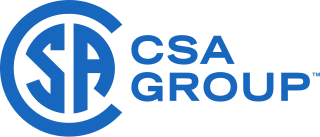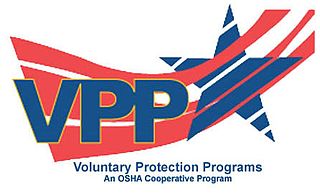The Occupational Safety and Health Administration is a large regulatory agency of the United States Department of Labor that originally had federal visitorial powers to inspect and examine workplaces. Congress established the agency under the Occupational Safety and Health Act OSH Act, which President Richard M. Nixon signed into law on December 29, 1970. OSHA's mission is to "assure safe and healthy working conditions for working men and women by setting and enforcing standards and by providing training, outreach, education, and assistance". The agency is also charged with enforcing a variety of whistleblower statutes and regulations. OSHA's workplace safety inspections have been shown to reduce injury rates and injury costs without adverse effects on employment, sales, credit ratings, or firm survival.

A forklift is a powered industrial truck used to lift and move materials over short distances. The forklift was developed in the early 20th century by various companies, including Clark, which made transmissions, and Yale & Towne Manufacturing, which made hoists. Since World War II, the use and development of the forklift truck have greatly expanded worldwide. Forklifts have become an indispensable piece of equipment in manufacturing and warehousing. In 2013, the top 20 manufacturers worldwide posted sales of $30.4 billion, with 944,405 machines sold.

Safety is the state of being "safe", the condition of being protected from harm or other danger. Safety can also refer to the control of recognized hazards in order to achieve an acceptable level of risk.

The UL enterprise is a global safety science company headquartered in Northbrook, Illinois, composed of three organizations, UL Research Institutes, UL Standards & Engagement and UL Solutions.
Sira is a UK-based notified body, specialising in ATEX, IECEX and North American product approvals.

The CSA Group is a standards organization which develops standards in 57 areas. CSA publishes standards in print and electronic form, and provides training and advisory services. CSA is composed of representatives from industry, government, and consumer groups.
Quality Assurance International (QAI) is a U.S.-based international organic certification company that is authorized by the United States Department of Agriculture (USDA) as "a USDA-accredited certifying agent that operates globally to certify organic operations to National Organic Program standards." It is a for-profit corporation, established in 1989, and headquartered in San Diego, California. It is one of the world's largest certifiers, operating in the United States, Canada, Latin America, European Union, and Japan. It is owned by public health and environmental organization NSF International.

Certification is the provision by an independent body of written assurance that the product, service or system in question meets specific requirements. It is the formal attestation or confirmation of certain characteristics of an object, person, or organization. This confirmation is often, but not always, provided by some form of external review, education, assessment, or audit. Accreditation is a specific organization's process of certification. According to the U.S. National Council on Measurement in Education, a certification test is a credentialing test used to determine whether individuals are knowledgeable enough in a given occupational area to be labeled "competent to practice" in that area.

Product certification or product qualification is the process of certifying that a certain product has passed performance tests and quality assurance tests, and meets qualification criteria stipulated in contracts, regulations, or specifications.
Right to know is a human right enshrined in law in several countries. UNESCO defines it as the right for people to "participate in an informed way in decisions that affect them, while also holding governments and others accountable". It pursues universal access to information as essential foundation of inclusive knowledge societies. It is often defined in the context of the right for people to know about their potential exposure to environmental conditions or substances that may cause illness or injury, but it can also refer more generally to freedom of information or informed consent.

A noise dosimeter or noise dosemeter is a specialized sound level meter intended specifically to measure the noise exposure of a person integrated over a period of time; usually to comply with Health and Safety regulations such as the Occupational Safety and Health (OSHA) 29 CFR 1910.95 Occupational Noise Exposure Standard or EU Directive 2003/10/EC.
Brazilian hair straightening is a semi-permanent hair smoothing method done by temporarily sealing a liquid keratin and a preservative solution into the hair with a hair iron.
Workplace health surveillance or occupational health surveillance (U.S.) is the ongoing systematic collection, analysis, and dissemination of exposure and health data on groups of workers. The Joint ILO/WHO Committee on Occupational Health at its 12th Session in 1995 defined an occupational health surveillance system as "a system which includes a functional capacity for data collection, analysis and dissemination linked to occupational health programmes".
An occupational fatality is a death that occurs while a person is at work or performing work related tasks. Occupational fatalities are also commonly called "occupational deaths" or "work-related deaths/fatalities" and can occur in any industry or occupation.
Accredited Crane Operator Certification OSHA regulation 29 CFR 1926 Subpart CC, released August 9, 2010, requires crane operators involved in construction to be certified by an accredited certification provider by November 10, 2014. An operator is defined as any person operating the equipment. To be accredited, certification providers must be accredited by a nationally recognized accrediting agency, defined as "an organization that, due to its independence and expertise, is widely recognized as competent to accredit testing organizations. Examples of such accrediting agencies include, but are not limited to, the National Commission for Certifying Agencies and the American National Standards Institute." This is the first time certification by an accredited certification provider has been required on a national level, although individual states and cities have required crane operator certification as far back as 2000. The new OSHA standards make the completion of this requirement an important topic of knowledge for the crane and lifting industry.

NSF is a product testing, inspection, certification organization with headquarters in Ann Arbor, Michigan. NSF also offers consulting and training services worldwide.

Occupational safety and health (OSH), also commonly referred to as occupational health and safety (OHS), occupational health, or occupational safety, is a multidisciplinary field concerned with the safety, health, and welfare of people at work. These terms also refer to the goals of this field, so their use in the sense of this article was originally an abbreviation of occupational safety and health program/department etc.

Voluntary Protection Programs (VPP) is an Occupational Safety and Health Administration (OSHA) initiative that encourages private industry and federal agencies to prevent workplace injuries and illnesses through hazard prevention and control, worksite analysis, training; and cooperation between management and workers. VPP enlists worker involvement to achieve injury and illness rates that are below national Bureau of Labor Statistics averages for their respective industries.
The American Industrial Hygiene Association (AIHA) is a 501(c)6 non-profit organization, whose mission is "Creating knowledge to protect worker health." The American Industrial Hygiene Association works to provide information and resources to Industrial Hygienists and Occupational Health professionals.
Point of use water filters are used in individual houses or offices to provide filtration of potable water close to the point of consumption. The related topic, Point of use water treatment describes full-scale water treatment options and technologies designed to serve communities when municipal water treatment fails or is unavailable.









